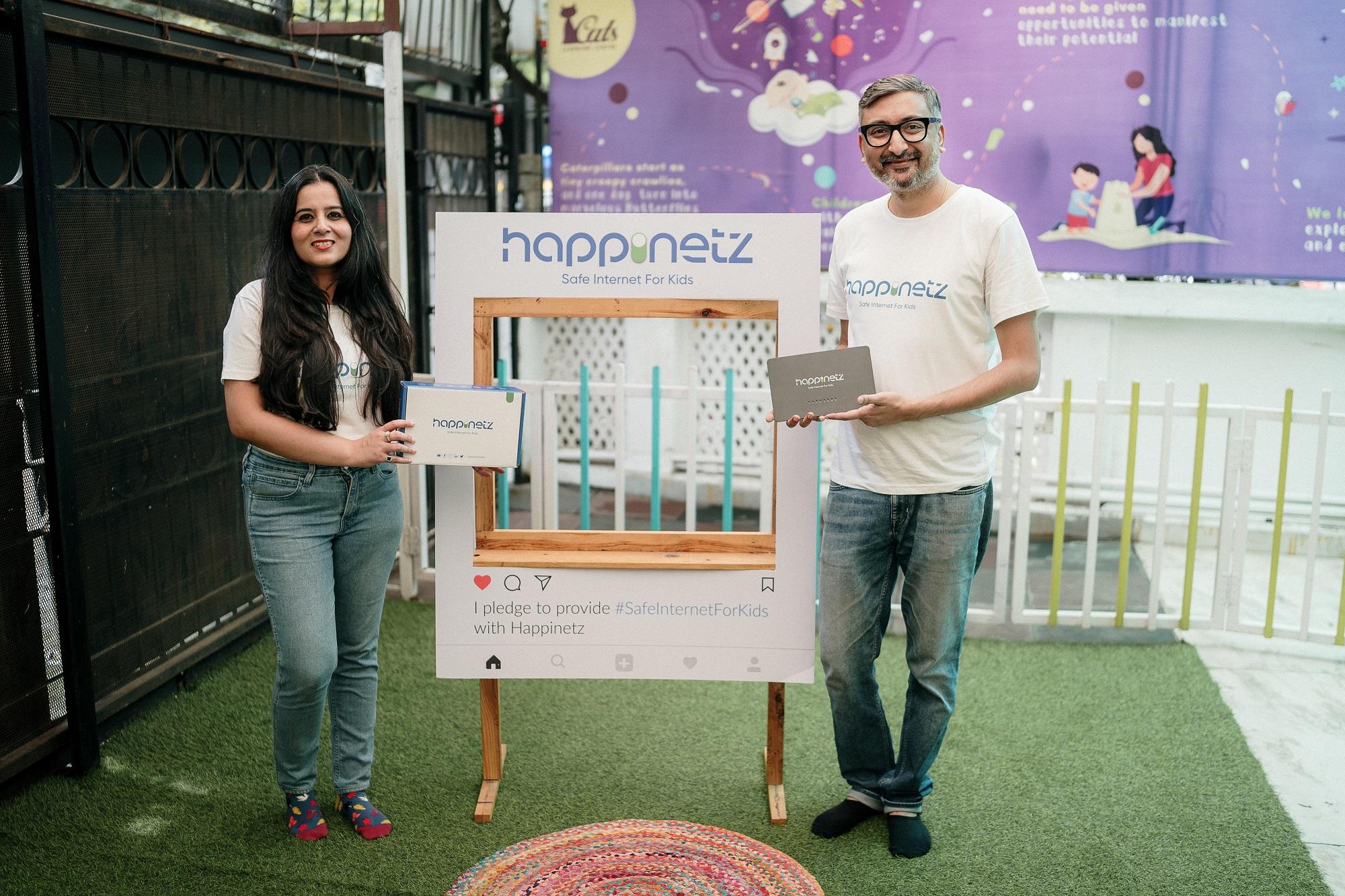Table of contents [Show]
- The daily tug-of-war we all know too well
- Meet Happinetz: an internet filter box for kids
- Quality of Internet matters as much as quantity
- Why Schools Must Lead the Digital Well-Being Movement
- That’s where Happinetz can play a role. Imagine:
- Beyond Filters: Why Families Must Talk About Internet Safety
- Parents Ask, Happinetz Answers
- How much does it cost? Is it one-time or yearly?
- 2. Will it work on every device in my home?
- 4. What if my child uses mobile data (not Wi-Fi)?
- 6. Is it safe from a privacy perspective?
- 7. What if my Happinetz box breaks?
- 8. Do schools need one Happinetz per classroom?
- A tool, not a trap
The daily tug-of-war we all know too well
If you’re a parent in 2025, chances are your day already sounds something like this:
“Please put the iPad down.”
“Homework first, then Netflix.”
“Wait… what website is that?”

The truth is, most homes today run on at least 4–6 devices; phones, tablets, laptops, smart TVs. And whether you live in Mumbai or Madrid, the problems feel the same:
- Too much time online: Screen time battles have become part of daily parenting.
- The wrong kind of content online: Kids get access to the same unsafe, unfiltered websites and apps as adults.
- No boundaries outside home: Once the device goes to tuition class, school, or a friend’s house, the rules disappear.
- No way to check if the child is really studying: Children faking studying while actually scrolling through social media, gaming or consuming adult content.

We’ve all tried apps like Family Link or the settings on Airtel and Jio routers to manage these challenges. They work for a while, until the kids discover VPNs, incognito tabs, or simply switch to another device. Our children are smart, curious, and faster at tech than us. The gap keeps growing.
That’s where Happinetz enters the picture; not as a spy tool, but as a family ally.
Meet Happinetz: an internet filter box for kids
Think of Happinetz as a safety filter for your home Internet. It’s a tiny box you plug into your existing Wi-Fi router. Once it’s on, it creates a separate Wi-Fi network that parents can control, monitor and curate as per their house rules.
Here’s why Happinetz is different from other solutions:
- Exhaustive filtering. Happinetz monitors over 110 million websites and apps and permanently blocks over 22 million adult and spam ones. It has a four-level AI filter to protect children as they browse.
- One rulebook for all devices. Phones, laptops, tablets, even smart TVs — once connected to Happinetz, follow the internet rules that you as a parent set.
- Parent-first solution. It’s a simple plug-and-play system where parents can toggle on or off 15 internet categories that Happinetz has pre-defined. Parents can use this app from anywhere, any time.
- Three simple modes. Kid Mode, Teen Mode, Parent Mode. One tap and the Internet reshapes itself to the right age group.
- Built-in pause button. Tired of repeating yourself? Tap pause, and that device goes offline instantly.
- Time windows. Homework from 4–7 pm? Gaming allowed only on Sundays? You set it once; Happinetz remembers.
- Ad-free, clean experience. Inbuilt ads and pop-up blocker.
- Insights & History. Parents can check detailed insights and internet history into what their child is doing online.
And yes, it blocks VPNs, proxies, DNS tricks all those little workarounds our children discover faster than we can Google them.
Quality of Internet matters as much as quantity
Parents often worry about “screen time hours,” but what about what’s inside those hours? Happinetz has built a filtering system that categorises the web into buckets:
- Education & online learning
- Social media
- Chat & forums (with the option to allow just WhatsApp or Teams)
- Video entertainment (Netflix, Hotstar, Prime: Whether you want to switch them on or off, it is your choice)
- Shopping, gaming, health & finance
- Ads & trackers
On Happinetz, for kids, SafeSearch is always on and YouTube runs in Restricted Mode, ensuring that explicit results and unsafe thumbnails don’t slip through. That means no adult thumbnails, no dodgy comments, and no 16+ videos sneaking in.
Parents don’t need to block websites manually one by one, Happinetz already monitors 110 million+ sites and keeps a permanent blocklist of unsafe and adult content.
“But what if my child takes the phone outside?”
This is the biggest fear for many parents. At home, you might manage Wi-Fi. But what about 4G/5G data, school Wi-Fi, or a friend’s hotspot?
Here’s the catch:
- On Android phones, the Happinetz Kids app enforces the same rules even on 4G/5G or public Wi-Fi. Your child cannot uninstall it without your password.
Why Schools Must Lead the Digital Well-Being Movement
If home is the first classroom, schools are the second and today, both are equally digital. Homework portals, Zoom sessions, coding classes, Google Classroom: our children’s education now flows through screens. But so do distractions. Walk into any school computer lab and you’ll see it, one tab open for learning, two sneaking into YouTube, gaming, or endless scrolling.
Here’s the truth: schools are no longer just teaching subjects; they’re shaping digital citizens. And just like we expect schools to enforce playground safety, we must expect them to ensure Internet safety too.
That’s where Happinetz can play a role. Imagine:
- Labs without chaos: where 15 desktops in a computer room stay focused on education because “Entertainment” and “Gaming” categories are simply off.
- BYOD-friendly campuses: where students bringing their own devices connect only to a school-safe Wi-Fi, one that doesn’t collapse into distractions.
- Homework aligned with classrooms: where parents don’t have to wonder if their child is “really studying” online, because the school and home Wi-Fi follow the same internet rules.
Right now, Happinetz is best suited for computer labs and smaller digital zones (about 15 systems per box). For full-school adoption across multiple classrooms and BYOD corridors, the team is building a separate school-wide solution. Early adopters can pilot the lab version today, while preparing for the larger rollout ahead.
For schools, Happinetz isn’t just another router. It’s an infrastructure choice that says: We take our students’ digital well-being as seriously as their academics. And when schools adopt that stance, something powerful happens: parents follow. Instead of screen-time battles happening in silos, families and schools can speak the same digital language.
Beyond Filters: Why Families Must Talk About Internet Safety
It starts with building that connection of trust and bonding with your child. Technology can help, but it cannot replace conversations. Installing a filter is only half the job, the other half is sitting down as a family and talking about why boundaries exist.
When children feel rules are imposed in secrecy, they often see them as punishments. But when they’re part of the conversation when you explain that the Internet is vast, full of learning but also full of harmful content they begin to see filters as protection, not restriction.
Psychologists warn that constant exposure to violent, sexual, or manipulative online content can trigger anxiety, shame, poor self-esteem, or even depressive spirals in children which is why global frameworks like UNICEF’s Child Online Safety Guidelines stress both tech safeguards and open family dialogue. Some kids internalise toxic messages; others may retreat into secrecy, afraid to talk about what they’ve seen. Both paths can affect long-term mental health and academic performance.
That’s why it’s not enough to say “No YouTube” or “Stop gaming.” Parents need to frame rules around trust and care:
- “We want you to explore the good parts of the Internet, not the parts that hurt you.”
- “We’re switching these settings on because your mind is still growing, and we want you to grow strong, not anxious.”
- “As you get older, we’ll open more doors together.”
When families speak this language, Happinetz (or any filter) becomes less of a control box and more of a safety net the whole family agrees on.

Parents Ask, Happinetz Answers
How much does it cost? Is it one-time or yearly?
The Happinetz box is priced at ₹7,999, that includes the hardware plus your first year of subscription. After that, it’s a simple ₹1,999/year renewal, which you can recharge directly through the Happinetz website or packs.
2. Will it work on every device in my home?
Yes. Phones, tablets, laptops, desktops, smart TVs, even gaming consoles. If the device connects to Wi-Fi, it can follow Happinetz rules.
3. My child is very tech-savvy. Can they bypass it?
We thought of that too. Happinetz has a four-layer bypass prevention system. Before launch, the team gave the box to hackers and even ISP engineers to try and crack it, none succeeded.
4. What if my child uses mobile data (not Wi-Fi)?
If they’re on an Android phone, the Happinetz Kids app enforces the same rules even on 4G/5G or public Wi-Fi.
5. What happens if my Internet goes down?
Happinetz runs on your existing home or school Internet. If your Wi-Fi drops, the Happinetz Wi-Fi drops too. There’s no backup network built in.
6. Is it safe from a privacy perspective?
Yes. Happinetz is GDPR-compliant. It does not collect personally identifiable data about your child or your family.
7. What if my Happinetz box breaks?
If your device has a hardware fault, the company offers replacement based on warranty coverage.
8. Do schools need one Happinetz per classroom?
For schools, Happinetz is developing a separate product. Right now, the current box can manage a computer lab with about 15 systems.
A tool, not a trap
The Internet is our children’s playground, library, and classroom all rolled into one. But like any playground, it needs fences.
Happinetz offers parents and schools something rare in 2025: a simple, central, no-drama way to manage the Internet.
And maybe, just maybe: it lets us reclaim a few evenings without shouting: “Enough screen time already!”
At Mapabear, we believe parenting deserves both, expert tools and honest conversations. For more stories that shape today’s parents, follow Mapabear.





 Guiding and Empowering Parents with fact-checked excellence -
Guiding and Empowering Parents with fact-checked excellence -